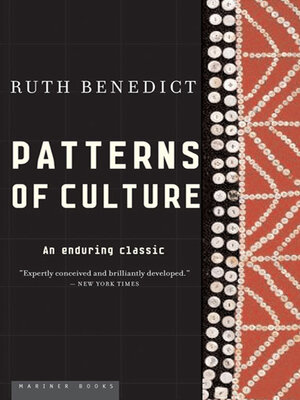
Sign up to save your library
With an OverDrive account, you can save your favorite libraries for at-a-glance information about availability. Find out more about OverDrive accounts.
Find this title in Libby, the library reading app by OverDrive.



Search for a digital library with this title
Title found at these libraries:
| Library Name | Distance |
|---|---|
| Loading... |
An anthropologist compares three diverse societies in this groundbreaking, “unique and important” cultural study (The New York Times).
A remarkable introduction to cultural studies, Patterns of Culture made history in exploring the role of culture in shaping our lives. In it, the renowned anthropologist Ruth Benedict offers an in-depth look at three societies—the Zuñi of the southwestern United States, the Kwakiutl of western Canada, and the Dobuans of Melanesia—and demonstrates the diversity of behaviors in them.
Benedict’s groundbreaking study shows that a unique configuration of traits defines each human culture and she examines the relationship between culture and the individual. Featuring prefatory remarks by Franz Boas, Margaret Mead, and Louise Lamphere, who calls it “a foundational text in teaching us the value of diversity,” this provocative work ultimately explores what it means to be human.
“That today the modern world is on such easy terms with the concept of culture . . . is in very great part due to this book.” —Margaret Mead
A remarkable introduction to cultural studies, Patterns of Culture made history in exploring the role of culture in shaping our lives. In it, the renowned anthropologist Ruth Benedict offers an in-depth look at three societies—the Zuñi of the southwestern United States, the Kwakiutl of western Canada, and the Dobuans of Melanesia—and demonstrates the diversity of behaviors in them.
Benedict’s groundbreaking study shows that a unique configuration of traits defines each human culture and she examines the relationship between culture and the individual. Featuring prefatory remarks by Franz Boas, Margaret Mead, and Louise Lamphere, who calls it “a foundational text in teaching us the value of diversity,” this provocative work ultimately explores what it means to be human.
“That today the modern world is on such easy terms with the concept of culture . . . is in very great part due to this book.” —Margaret Mead







